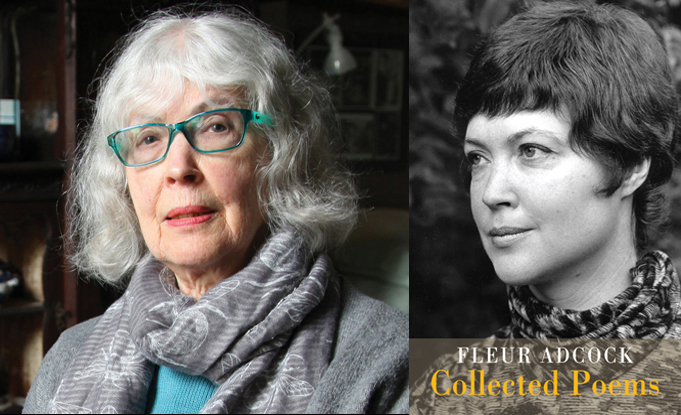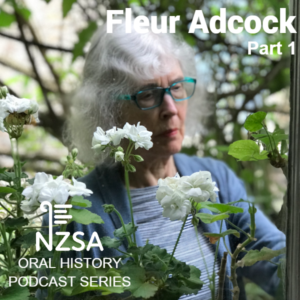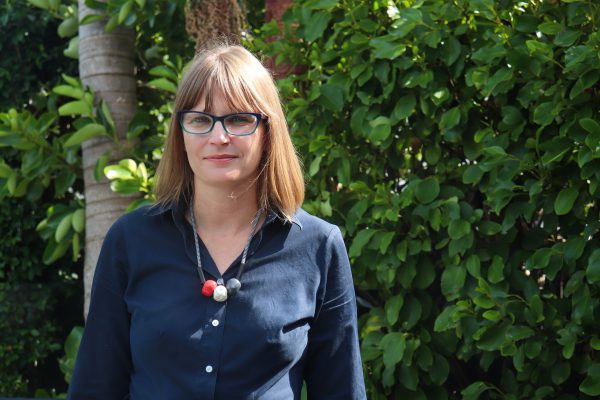
We are immensely saddened by news of the death of Fleur Adcock, who celebrated her 90th birthday in February with the publication of her Collected Poems. She was taken to hospital last month after a fall, but was diagnosed with a metastatic brain tumour and admitted to the North London Hospice in Finchley, where she died yesterday after a short illness.
Fleur Adcock was born in Papakura, New Zealand in 1934. Her ancestry was Northern Irish and Northern and Midland English, and she explored the lives of her forebears in many of her poems, as well as the experiences of her grandparents as pioneer settlers in New Zealand in during the time of the First World War.
Fleur herself spent the Second World War years in England, returning with her family to New Zealand in 1947. She studied Classics at the University of Wellington, gaining a BA in 1954 and an MA in 1956, and worked as a librarian in New Zealand from 1958 to 1963. She married poet Alistair Te Ariki Campbell in 1952, and they had two sons, Gregory and Andrew, divorcing in 1958. Her second marriage to novelist Barry Crump in 1962 only lasted five months, and they divorced in 1963. Fleur emigrated to Britain in 1963 with her younger son Andrew, working as a librarian at the Foreign and Commonwealth Office in London until 1979.
Her first collection, The Eye of the Hurricane, was published in New Zealand in 1964, and over the course of the next sixty years, she came to be regarded as one of her country’s most esteemed and much-loved poets both in Britain and New Zealand. She received an OBE in 1986, and was presented with the Queen’s Gold Medal for Poetry for 2006 from HM Queen Elizabeth at Buckingham Palace, with recognition given in particular for her Poems 1960-2000 (Bloodaxe Books, 2000).
Her mother was a poet, and her younger sister Marilyn Duckworth is also a writer, as celebrated in New Zealand as a novelist as Fleur is as a poet. Fleur was presented with the New Zealand Prime Minister’s Award for Literary Achievement in Poetry 2019 by the Rt Hon (now Dame) Jacinda Ardern. Marilyn received the Prime Minister’s Award for Literary Achievement in fiction three years earlier.
Being awarded two residencies in the north of England over three years enabled her to switch from working as a librarian to supporting herself as a freelance writer. In 1977-78 she was writer-in-residence at Charlotte Mason College of Education, Ambleside, in Cumbria. She was Northern Arts Literary Fellow at the universities of Newcastle and Durham in 1979-81, living in Newcastle for those two years.
Fleur Adcock’s Below Loughrigg was the second publication from Bloodaxe Books, then a fledgling small press, back in 1979, and they published three other titles, two pamphlets and a translation, between then and 2000, when she brought the first of all of her subsequent books to Bloodaxe following Oxford University Press’s closure of its poetry list, with Victoria University Press (now Te Herenga Waka University Press) becoming her New Zealand publisher.
Her Poems 1960-2000 was followed by Dragon Talk (2010), Glass Wings (2013), The Land Ballot (2015), Hoard (2017) and The Mermaid’s Purse (2021). Poems 1960-2000 and Hoard were Poetry Book Society Special Commendations while Glass Wings was a Poetry Book Society Recommendation. Her Collected Poems was published both by Bloodaxe Books in the UK and Te Herenga Waka University Press in New Zealand on her 90th birthday in February 2024.
Fleur Adcock’s poised, ironic poems are tense and tightly controlled as well as shrewdly laconic, and often chilling as she unmasks the deceptions of love or unravels family lives. Disarmingly conversational in style, they are remarkable for their psychological insight and their unsentimental, mischievously casual view of personal relationships. She explored questions of identity and rootedness throughout her work, both in relation to her personal allegiances to her native and adopted countries as well as her family history, whose long-dead characters she brings to life. She also wrote movingly of birth, death and bereavement, and has tackled political issues with honest indignation and caustic wit. According to The Oxford Companion to New Zealand Literature, her poems are often written from the perspective of an outsider or express a divided sense of identity inherited from her own emigrant experience and separation from New Zealand family.
Neil Astley, her editor at Bloodaxe, said: ‘Fleur was always a delight to work with on all her books, and publishing her Collected Poems on her 90th birthday was a highlight. I knew her for 50 of those 90 years. She became a treasured and trusted friend as well as a poet whose work I felt privileged to publish. Despite failing eyesight, she took up the challenge of helping us launch her marvellous Collected Poems this year, using enlarged photocopies of her poems to give much appreciated readings from the book in her warm, inimitable style to audiences in London, St Andrews, Newcastle and Ledbury. Fleur was also a pioneer in British and New Zealand poetry: for many years she was one of very few women poets known to the reading public with the poetry lists of the main book publishers consisting almost entirely of white male poets, and the poetry anthologies featuring very few – if any – women writers. All that seems inconceivable now. Fleur’s work and example were inspirational for the generations of women poets who followed her, helping bring about the huge shift which has made poetry publishing much more diverse, inclusive and representative of all writers in both of her countries during the latter part of her writing career.’
Fleur Adcock’s reading from her Collected Poems at Newcastle Poetry Festival in May 2024 was filmed:
‘Fleur Adcock’s Collected Poems is a vast treasure chest of vivid, memorable poetry. Opening it at almost any page I find strikingly original turns of phrase and thought or sophisticated plays on register […] The richness of the work expresses itself in Adcock’s ability to deploy very different writing styles with equal poise and precision […] Driving this linguistic virtuosity, giving it purpose, there are complementary intellectual and imaginative strengths.’ – Edmund Prestwich, London Grip
‘One of the advantages about a collected edition is that it enables the reader to gain an insight into a poet’s development and to gauge the extent to which his or her style has changed over time. In the case of Adcock, the barometer has hardly moved at all: her work has been consistently good right from the start […] The relaxed, conversational style that has become her hallmark over the years is a testament to the power of plain words when placed within a poetic context […] This major retrospective of her work will be welcomed with enthusiasm by all who wish to study in depth the span of Adcock’s literary career.’ – Neil Leadbeater, Write Out Loud
‘This monumental Collected serves as a historical document – hundreds of snapshots, in the backgrounds of which pass millions of lives – as much as an artistic one, the sixty-year-long record of a piercing, curious mind. Adcock’s poems have the confidential feel of a private journal, all witty asides and wry observations, following her imagination into her ancestors’ past, her youth during the war, old loves and friendships. A book like this is a rare thing indeed, a life lived in poems.’ – Dave Coates, Poetry Book Society Spring Bulletin 2024
‘Fleur Adcock may be about to turn 90, but – as her new Collected Poems shows – she’s still writing essential work. Originally from New Zealand, since settling in England in 1963 she has become one of the most celebrated, and quietly influential, voices in British poetry. Adcock writes with a rare lightness of touch, and a candour that’s often seen her labelled a confessional poet. “For a Five-Year-Old” is one of her earliest poems, but its careful balancing act of light and dark – warmth on the one hand, faintly shocking, self-critical humour on the other – sets the tone for her later writing.’ – Tristram Fane Saunders, The Telegraph (Poem of the Week)
‘Adcock has a deceptively laid-back tone, through which the sharper edge of her talent is encountered like a razor blade in a peach.’ – Carol Ann Duffy, The Guardian
‘Adcock’s reputation has been founded on her spare, conversational poems, in which the style is deceptively simple, apparently translucent…those who see in such poems only flatness are missing the power of a voice which teases both reader and subject.’ – Jo Shapcott, TLS
‘Informality and immediacy are good ways to remake a world; and Adcock’s style has not dated in the half-century since her debut.’ – Fiona Sampson, The Guardian
‘Most of Fleur Adcock’s best poems have something to do with bed: she writes well about sex, very well about illness, and very well indeed about dreaming… Her imagination thrives on what threatens her peace of mind, and only when she is unguarded can these threats have their full creative effect. Hence the importance of bed: it is the place where the elegant artful barriers that she builds from day to day are most easily over-thrown… Throughout her writing life, she has made a fine art from holding on to principles of orderliness and good clear sense; but she has made an even finer one from loosening her grip on them.’ – Andrew Motion, TLS
Fleur Adcock reads nine poems
Fleur Adcock reads nine poems from her Collected Poems: ‘The Video’, ‘For a Five-Year-Old’, ‘The Pangolin’, ‘An Illustration to Dante’, ‘Things’, Weathering’, ‘For Heidi with Blue Hair’, ‘Where They Lived’ and Counting’.. Pamela Robertson-Pearce filmed Fleur Adcock at her home in London on 29 June 2007. This film is from the DVD-anthology In Person: 30 Poets, filmed by Pamela Robertson-Pearce & edited by Neil Astley (Bloodaxe Books, 2008).
[11 October 2024]





